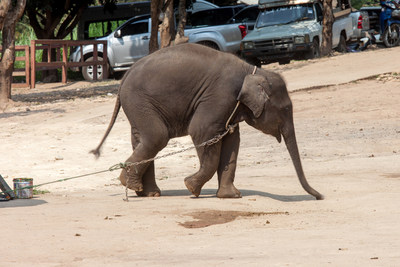
TORONTO, Nov. 22, 2018 /CNW/ - Just over half a million captive wild animals globally are suffering to entertain tourists, including elephants, sloths, tigers and dolphins. Many animals are beaten, chained up, isolated and forced to perform tricks. These experiences often cause the animals pain and psychological trauma. Many tourists are animal lovers who don't realize these attractions harm animals.

Travel trade associations, for the most part, are looking the other way. World Animal Protection commissioned the University of Surrey to review 62 travel associations on whether they provide their members with animal welfare guidelines and require them to be met. The research shows only three of the 62 associations provide guidelines (TA (UK), ANVR (Dutch Association of Travel Agents and Tour Operators) and GSTC (Global Sustainable Tourism Council) and only one (ANVR) is monitoring its members' progress in implementing the guidelines.
The research also states that around 110 million people annually visit cruel wildlife attractions, either independently or through tour operators or travel agents.
Not only is all this harmful to animals but there are also major safety risks to tourists participating in wild animal attractions. In Thailand, 17 fatalities and 21 serious injuries were reported in venues with captive elephants between 2010 and 2016.
"We hope travel associations will consider the research findings, step up, show leadership and take action to protect animals," says Melissa Matlow, the Senior Wildlife Campaign Manager at World Animal Protection. "Some travel companies have committed to not selling cruel attractions, but many still do. There will be a big impact on animals' lives if travel companies align with tourist values on animal welfare."
Strong views on wildlife protection are especially common in younger generations. Research firm, Northstar, recently conducted a series of traveller focus groups for World Animal Protection that showed people under 35 are more aware of animal cruelty issues. They prefer seeing animals in their natural habitats rather than in forced interactions.
World Animal Protection is also working with various travel companies in Canada, including G Adventures and World Expeditions.
G Adventures is shifting tourist demand towards more ethical wildlife tourism. They are also part of CEWT (The Coalition for Ethical Wildlife Tourism) along with World Animal Protection. This coalition was created to encourage stronger industry standards and legislation to phase out using wild animals for tourist entertainment.
"Travel trade associations have a very important role to play in educating their members about responsible travel," says Jamie Sweeting, Vice President for Social Enterprise and Responsible Travel at G Adventures, "Too many animals continue to be harmed by tourism and we call on travel trade associations globally to do more to work with their members to put a stop to this cruel and unnecessary behaviour."
Several recommendations from World Animal Protection were put forward from the report. Vague language – such as 'good conditions' and 'natural behaviour' – should be avoided within any animal welfare guidelines. Elephant riding and other direct visitor interaction and forced performances with wild animals must be classed as unacceptable.
Although it's clear more work needs to be done, the mission of World Animal Protection is not going unnoticed. It was recently announced that the charity grabbed the top spot in the "Best for Wildlife" category at the World Travel Market, in London, U.K, based on the success of its global Wildlife Not Entertainers campaign to improve animal welfare and wildlife conservation. The charity now has over 200 travel companies no longer selling captive elephant entertainment.
Over 1.6 million people have signed World Animal Protection's animal friendly travel pledge. This signals there is a demand to phase out cruel wildlife attractions, like elephant riding, dolphinariums, and tiger selfies once and for all.
Click here to read the report. 'Associated with Cruelty: How travel trade associations are ignoring wild animal abuse'.
Click here to learn more about the Gold Responsible Tourism Award: https://news.wtm.com/world-responsible-tourism-awards-2018/
About World Animal Protection:
World Animal Protection, formerly known as the World Society for the Protection of Animals (WSPA), is active in more than 50 countries. From our offices around the world, we work with businesses, governments, local partners and animal welfare organizations to find practical ways to prevent animal suffering worldwide. www.worldanimalprotection.ca/wildlife-not-entertainers
SOURCE World Animal Protection


There is no comments yet.
You must login Login Sign up